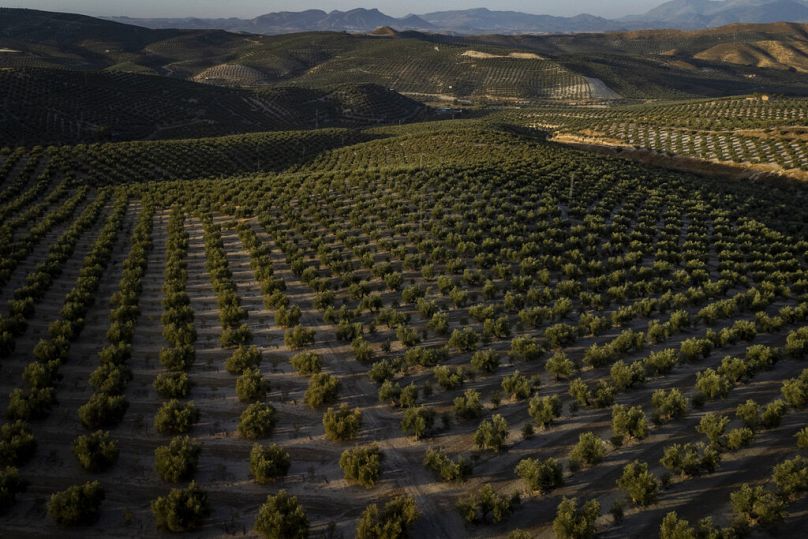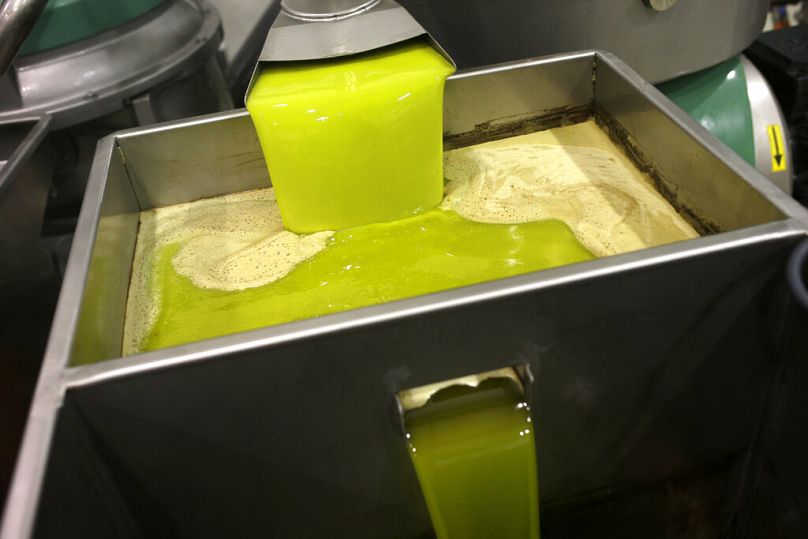Faking olive oil is a confidence trick on customers and a betrayal of passionate farmers who make the real thing with love and passion. But the greater crime is what’s behind the price rise and the turbocharging of fraud, Eurof Uppington writes.
Olive oil fraud is in the news again after 11 arrests and the seizure of 260,000 litres of dodgy product in Spain late last year.
Adulteration or outright fakery of extra virgin olive oil (EVOO) is always a problem, but it’s gone into overdrive in recent months with a skyrocketing price.
Faking olive oil is a wicked crime: a confidence trick on customers and a betrayal of passionate farmers who make the real thing with love and passion.
But bad as it is, the greater crime is what’s behind the price rise and the turbocharging of fraud.
That’s the ecocide committed in the Spanish countryside by an unholy alliance of misguided farmers, the agro-industrial olive oil complex, price-cutting supermarkets and the providers of toxic herbicides, pesticides and other products, such as Bayer and Syngenta.
They’ve sown the wind, and are reaping the whirlwind.
The inevitable result of our approach to food
Olive oil is the first industry to be fully disrupted by climate change.
Since the rise of global demand for EVOO in the 1980s and 1990s, olive oil has become dominated by big companies that intensively blend products from giant industrial farms.
Many of them are based in Andalucia, a region that provides 30%-50% of global supply all by itself.
These farms, and other intensive crops, have destroyed regional ecosystems through intense chemical agriculture, making their landscapes hugely vulnerable to climate change.
Megadroughts and local heatwaves have devastated supply in these key regions, driving up global prices to 30-year highs. No one in the industry has seen anything like it.
To those of us in the regenerative agriculture movement, this story is not a surprise, but rather the inevitable result of our industrial-intensive food system.
It goes like this. In the 1990s, olive farmers realised they could boost yields and cut production costs by ripping out century-old rain-fed, organic olive plantations and replanting them with dense rows.
The land couldn’t support this massive increase in nutrient and water demand, but this didn’t matter; artificial fertilizer would provide the nutrients, and local aquifers the irrigation.
Competition from weeds? Spray herbicide. Monocultures that attract pests? More spraying.
These extra costs were more than made up for by getting rid of people. Stumpy, bushy tree rows could be sprayed, trimmed, and harvested by vastly cheaper machines.
We got cheaper olive oil, but at what price?
Encouraged by agronomists and academic research, so-called “super high density” cultivation spread across Spain and took root in Andalucia. It now accounts for almost half of global EVOO production.
We got cheaper olive oil. But the Spanish countryside was emptied of people. Water tables collapsed, with chemical runoff poisoning the water that was left.
Grasses, shrubs and soil were replaced by bare, hard-packed dirt surrounding kilometres-long rows of trees, raising ground temperatures and eradicating animal, insect, and bird life. It even stopped raining, making the drought even worse.
Cue global heating in this fragile, abused ecosystem. Temperatures in Spain of 40C in early 2022 disrupted the olive flowering and ruined the 2022-2023 harvest. Unprecedented water shortages in 2023 ruined the current one.
We’ve never seen two failed harvests in a row; global reserves have been used up. Should there be a third failure, the industry consequences could be devastating.
So now we have an industry in a crisis of its own making. In Spain, the domestic EVOO market dropped 40% in 2023 — given the importance of olive oil to Spanish food that's as if British people cut tea consumption in half.
A healthier approach exists — and it would be worth it
But there’s still hope. The mission of companies like Amfora is to connect customers directly to smaller farms that use regenerative agriculture to protect soil, encourage biodiversity, and revive rural communities.
We're not trying to feed the world, just bring traceability and sustainability to a screwed-up industry. We can’t go back in time, either; high-density farms aren’t going to go away. We need their output to meet global demand. EVOO shouldn’t just be a product for the rich.
For sure, these intensive farms can never be as sustainable or regenerative as our farmers are, but they can borrow their ideas: replace bare ground between trees with vegetation, ease off on the chemicals, and encourage soil life and life above ground.
Climate change won’t go away, but the EVOO industry will be less vulnerable to it.
Just covering ground with grass and shrubs can lower ground temperatures and allow the soil to retain water much better.
There's a chance it could even bring back some local rainfall. These changes are already being encouraged by local governments and the EU, but they also need a mental shift from the growers, the industry, and the consumer.
Farmers might have to give up a bit of yield at first — but that's better than going without any product at all.
Creating resilient supply through targeted regeneration is the best way to overcome the fraud problem in the future, but the environmental benefits, potentially reviving whole ecosystems in Andalucia and southern Spain, could be much more important.
Let’s not waste this crisis.
Eurof Uppington is the CEO and Founder of Amfora, a Switzerland-based importer of extra virgin olive oils.
At Euronews, we believe all views matter. Contact us at view@euronews.com to send pitches or submissions and be part of the conversation.













